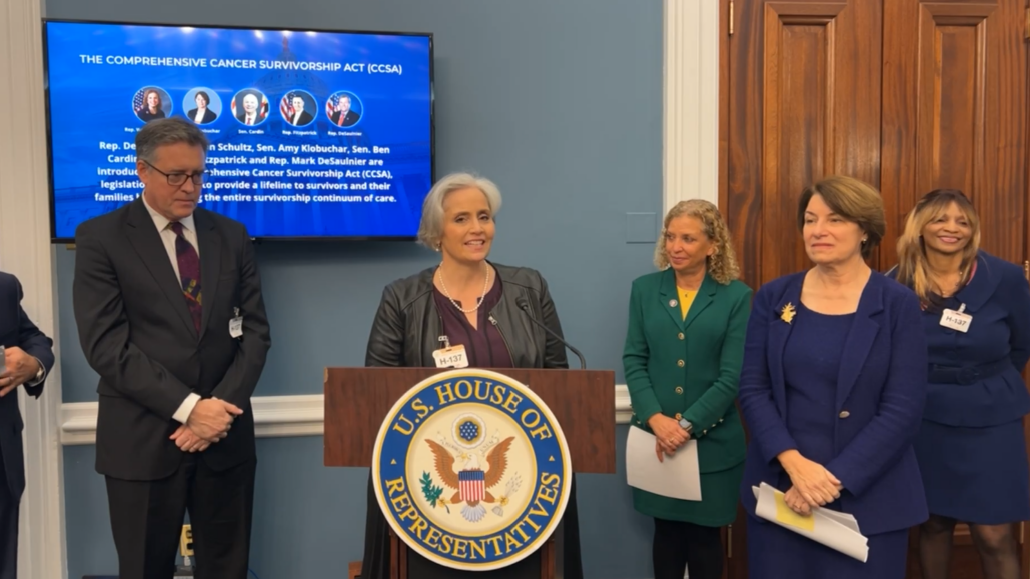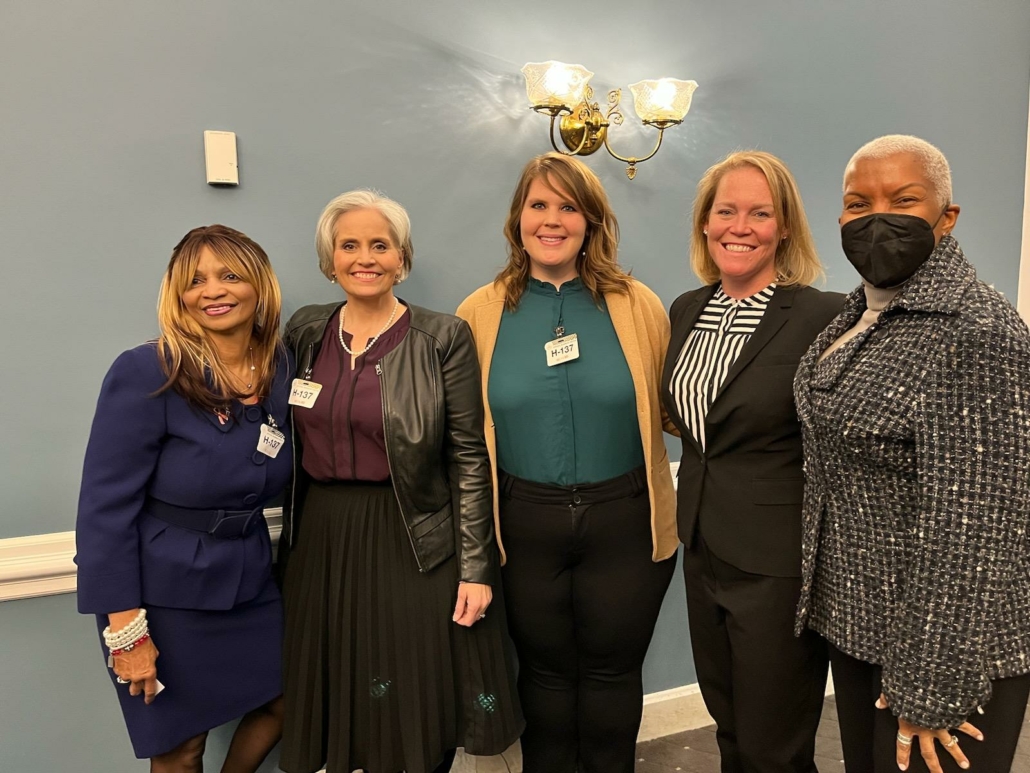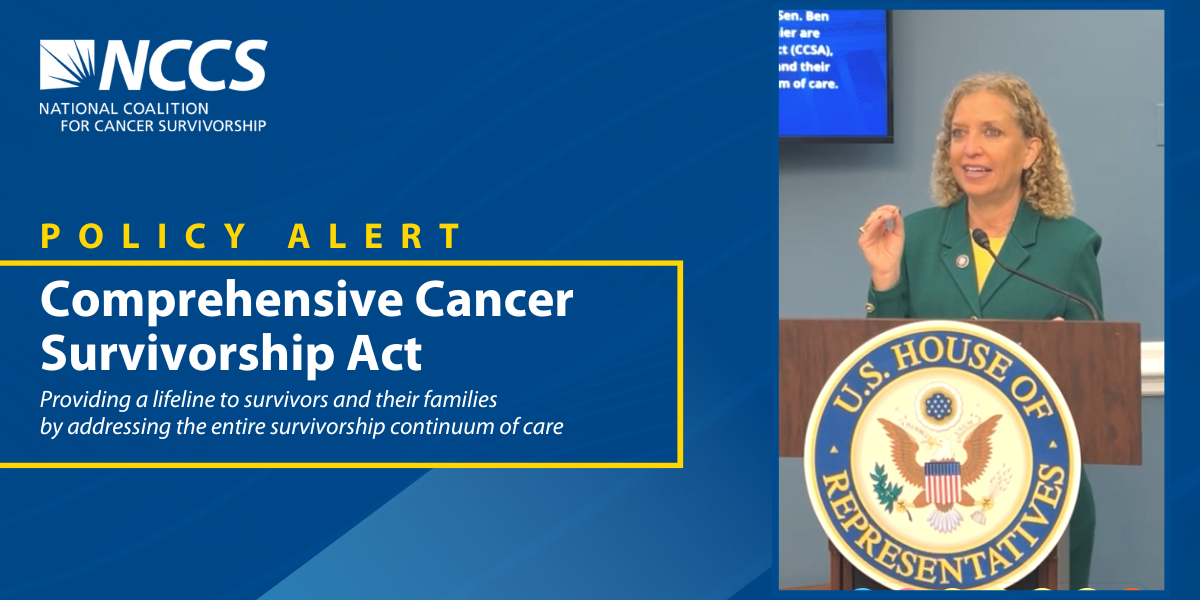NCCS Celebrates Launch of Comprehensive Cancer Survivorship Act
Representative Debbie Wasserman Schultz (FL-23), a champion for cancer survivors and a survivor herself, held a press conference today to introduce the Comprehensive Cancer Survivorship Act (CCSA), new comprehensive survivorship legislation that will directly benefit cancer survivors. She was joined by Senators Ben Cardin (D-MD) and Amy Klobuchar (D-MN), who will lead the legislation in the Senate, and Representatives Mark DeSaulnier (CA-11) and Brian Fitzpatrick (PA-1), who will co-lead the legislation in the House of Representatives.

NCCS CEO Shelley Fuld Nasso provides remarks at CCSA press conference.
This legislation addresses the entire continuum of care – from diagnosis to active treatment and post-treatment – to close many of the gaps patients face so that they may no longer feel like they are “lost in transition.” This extensive legislation will provide coverage for care planning services to address transition to primary care, develop comprehensive navigation services, establish workforce assistance grants, provide education and awareness through resources for survivors and health care providers, ensure coverage for fertility preservation services, and require study of the existing reimbursement landscape and development of an alternative payment model, among many other things.
Shelley Fuld Nasso, National Coalition for Cancer Survivorship’s (NCCS) CEO, was honored to speak at the event, and shared key takeaways from NCCS’s 2022 State of Survivorship Survey. The survey revealed cancer survivors have a lower level of satisfaction with their post-treatment care and often do not speak with their doctors about issues other than screening at post-treatment visits, despite the fact that more than half of cancer survivors still experience symptoms 10 years after active treatment.

Representing NCCS’s support of CCSA: (from left to right) Sharon Rivera, Shelley Fuld Nasso, Haley Smoot, Elena Jeannotte, and Lisa Rice.
Sharon Rivera-Sanchez, a cancer survivor and member of NCCS’s Cancer Policy and Advocacy Team (CPAT), also spoke at the event and stressed the importance of this legislation in helping cancer survivors like herself. Sharon highlighted the many barriers survivors face, including financial and transportation barriers and long-term side effects, and she emphasized that survivors often feel they are on their own in figuring out how to navigate their cancer and its lasting effects.
Representative Fitzpatrick pointed out that 20% of diagnoses are relapses, sharing that his brother passed away when his cancer relapsed. He stressed the importance of this legislation in addressing the gaps cancer survivors face and called on survivors and advocates to push this legislation forward so CCSA can become a reality.
Representative Wasserman Schultz acknowledged the challenging work that lies ahead and called on all members of the cancer community to lend their voices to this collective effort. NCCS looks forward to working with advocates and Members of Congress to advance this effort to improve the quality of life and quality of care for cancer survivors.
What Does the Legislation Include?
The legislation includes the following provisions:
- Coverage of cancer care planning and coordination services: Establishes a Medicare service and payment for cancer care planning and coordination services to help improve care coordination and cancer survivors’ transition to primary care.
- Survivorship transition tools: Requires the evaluation and publication of information resources for cancer patients and providers for consolidating treatment history and survivorship guidelines into a personalized survivorship care plan to guide follow-up care.
- Alternative payment model: Requires the US Department of Health and Human Services (HHS) to conduct a study and submit a report outlining an alternative payment model for payment for items and services relating to survivorship care.
- Survivorship navigation: Requires review of navigation programs and submission of a report assessing how navigation programs can best be developed across the continuum of care. HHS must also conduct a demonstration program, awarding grants to eligible entities to provide navigation services to cancer survivors.
- Survivorship care demonstration program: Requires HHS to conduct a demonstration program aimed at improving the quality of cancer survivorship care, in which grants will be awarded to diverse demonstration sites and a variety of survivorship care strategies can be evaluated.
- Cancer survivor workforce assistance grants: Requires the development of a grant program for eligible entities to provide education and targeted assistance, such as transportation, nutritional, and financial assistance, to cancer survivors and their families and caregivers who experience workforce challenges.
- Comprehensive cancer survivorship program: Requires HHS to carry out a comprehensive cancer survivorship program that includes a cancer survivorship resource center to provide evidence-based resources to cancer survivors, a health care professional resource center to assist and educate health care professionals in the delivery of high-quality survivorship care, an educational campaign to provide health care professionals with resources to improve cancer survivorship care, and a program of supportive care services to improve survivors’ quality of life and long-term survivorship.
- Adult cancer survivorship study: Requires HHS to complete an analysis assessing the creation of an adult version of the Childhood Cancer Survivor Study and the associated financial costs, as well as identifying data sources and gaps and strategies to publish data in a manner accessible to survivors, providers, researchers, and the public.
- Survivorship progress report: Requires a study of the progress made in cancer survivorship over the last 50 years.
- Promoting state innovations to ease transitions to the primary care setting for children with cancer: Requires HHS to convene a group of stakeholders representing childhood/adolescent cancer survivors to develop best practices for states to ease the transition of children and adolescents with cancer from active treatment to primary care and ensure development and delivery of survivorship care plans to these survivors.
- Childhood cancer demonstration model and standard of care: Creates a new Medicaid pediatric survivorship care demonstration model the Center for Medicare and Medicaid Innovation is encouraged to implement, which would promote a standard of care to manage the transition of children from active treatment to primary care through promotion and use of survivorship care plans.
- Medicaid coverage of fertility preservation services for cancer patients: Ensures Medicaid coverage of fertility preservation services for individuals diagnosed with cancer who undergo treatment that may lead to iatrogenic infertility.
Read the press release.
CCSA Fact Sheet
This fact sheet summarizes the need for the CCSA and highlights some of the most important provisions.
CCSA Fact Sheet
 Loading...
Loading...
CCSA: Section-By-Section Summary
This document breaks down each of the provisions in the CCSA and describes them in detail.
CCSA Section-By-Section Breakdown
